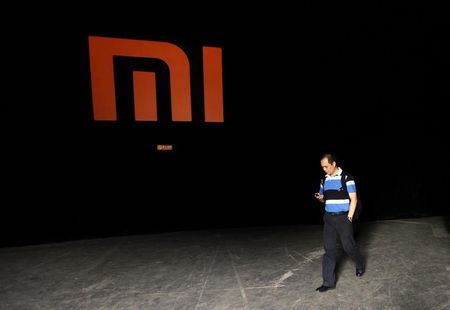By Michael Gold
TAIPEI (Reuters) - The Taiwanese government is investigating whether Xiaomi Inc (XTC.UL), China's leading smartphone company by domestic shipments, is a cyber security threat and will make a decision within three months.
The government began performing independent tests on Xiaomi phones after reports in recent months that some models automatically send user data back to the firm's servers in mainland China, Gin-Shian Lou, a director at Taiwan's National Communications Commission, said on Wednesday.
The probe is a reminder of the scrutiny Chinese technology firms are subject to abroad as governments become increasingly wary of potential cyber security threats from the world's second-biggest economy. China's government and companies are frequently accused of cyber and industrial espionage.
The investigation also throws the spotlight on cross-strait politics. China and Taiwan have been historical foes since defeated Nationalists fled to the island after losing a civil war to China's Communists in 1949. The government in Beijing still regards Taiwan as a renegade province.
Privately owned Xiaomi has faced several allegations of security leaks in recent months. In August, the company publicly apologised and said it would change a default cloud feature after a Finnish security company found proof that Xiaomi collected address book data without permission.
"We wanted to ensure the situation was as they said, so we decided to perform our own tests," Lou told reporters in Taipei, referring to Xiaomi's assurances.
The test results should be made public soon, Lou said. It wasn't immediately clear whether the investigation could lead to any ban for Xiaomi's low-priced smartphones in Taiwan.
Xiaomi declined to comment.
The Chinese smartphone maker has also been accused in the Hong Kong media of sending copies of user text-messages back to servers on the mainland, a claim that the company has vigorously called false and libellous.
Under the law in mainland China, firms storing data on China's soil are to comply with any data requests from the government. Data stored by Taiwanese users on the mainland could be vulnerable to such requests. Some companies, notably Google Inc (O:GOOGL), have opted not to situate servers in China.
Yahoo Inc (O:YHOO) came under criticism in 2005 after it handed to Chinese authorities emails that led to the imprisonment of Shi Tao, a journalist who obtained and leaked an internal censorship order the government had sent Chinese media.
Apple Inc (O:AAPL) said last month that it had begun to store users' personal data on servers on the mainland, marking the first time the tech giant has stored user data on Chinese soil.
VIEWED WITH SUSPICION
Tensions between China and Taiwan have eased in recent years under Taipei's China-friendly president Ma Ying-jeou. The two sides have signed agreements on everything from finance to tourism.
But Taiwan still often views Chinese firms with suspicion while the government in Beijing has not ruled out the use of force should the self-ruled island formally declare independence.
Since August, Taiwan's police force has encouraged employees not to use WeChat, the mobile messaging app developed by Chinese internet giant Tencent Holdings Ltd (HK:0700).
Concerns are mounting that Taiwan is over-reliant on the mainland. Critics of Beijing argue expanding economic ties allow China to influence the island's fiercely democratic politics.
Taiwan's government also said in a statement on Tuesday that popular Japanese instant messaging service Line, owned by South Korea's Naver Corp (KS:035420), will be banned from use on government work-related computers, also due to security concerns.
A Line spokeswoman based in Tokyo told Reuters that the company is investigating the matter but would not provide more details.
Although the vast majority of Xiaomi's sales come from China, the company has set up shop elsewhere in Asia, including Singapore, Malaysia, Indonesia, the Philippines and India. It is also eyeing expansion into countries like Thailand, Brazil and Mexico.

Hong Kong's public broadcaster quoted the head of the mainland's Taiwan Affairs Office as expressing dismay over Taiwan's decision, saying "one cannot stop the attractiveness of Xiaomi phones among compatriots across the strait".
(Additional reporting by Paul Carsten and Gerry Shih in BEIJING, Teppei Kasai in TOKYO and Yimou Lee in HONG KONG; Editing by Ryan Woo)
_800x533_L_1412662134.jpg)